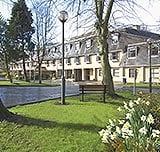
Search by region


Woodland Hospital
Kettering, Northamptonshire
Rothwell Road, Kettering, Northamptonshire NN16 8XF 01536 210019 Book Online
Loop recorder implantation is the insertion of a small heart-monitoring device just under the skin on your chest using minor surgery. The loop recorder is also called a cardiac event recorder. It records the electrical signal from your heart continuously.
Heart conditions that require an implantable loop recorder (ILR) include:
A loop recorder is usually fitted in an outpatient setting and takes about ten to 15 minutes. You will be given a local anaesthetic so you will be awake but you won’t feel any pain.
There are two types of implantable loop recorder devices:
After the loop recorder is in place, the cut is closed using glue or stitches if needed.
An implantable loop recorder can stay in place for up to three years to continuously monitor your heart rate and rhythm.
Once your cardiologist has enough information to understand what is causing your symptoms, they may decide to remove or replace your loop recorder or start treatment.
Loop recorder implantation is a straightforward procedure with very little risk. Your risks will depend on your age, other medical conditions, and other factors.
Problems that may happen include:
The benefits of having a loop recorder implantation are that it:
The cost of a coronary angiogram will depend on your Ramsay hospital of choice.
You will receive a formal quotation price for your loop recorder implantation following your consultation with one of our expert cardiologists. This formal quote will be valid for 60 days.
Ramsay is recognised by all major medical insurers, this treatment is covered by most medical insurance policies as long as they are deemed medically necessary by your doctor. We advise you to obtain written authorisation from your insurance provider.
We have a number of finance options if you are paying for your treatment yourself with no deposit and benefit from flexible payment plans to suit your finances. Find out more about accessing healthcare with us here.
A loop recorder implantation is a long-term heart recording device.
Your sinoatrial (SA) node in the upper right chamber of your heart (right atrium) has a special group of cells that initiate an electrical signal. This starts your heartbeat and helps pump blood in a coordinated way.
Heart rhythm problems can happen if this signalling pathway is disrupted. An abnormal heart rhythm (arrhythmia) may mean your heart cannot pump as much blood as is needed. Reduced blood flow to your brain can cause fainting and palpitations. When your heart rhythm returns to normal, your blood flow is restored and you usually regain consciousness.
A loop recorder is implanted for several reasons. Most commonly, loop recorder implantation is performed to look for causes of fainting, palpitations, very fast or slow heartbeats, and hidden rhythms that can cause strokes.
You can access expert cardiologists and will benefit from a convenient appointment without waiting at our Ramsay hospitals.
When you visit one of our hospitals for your loop recorder implantation, you can rest assured that we follow strict infection control protocols for you your safety.



We are proud to recognise Mr. Peter Hodgkinson for 20 years of dedicated service as MAC Chair at Cobalt Hospital, and to welcome our new chair Mr. Andrew Gray.
West Midlands Hospital was delighted to welcome Alex Ballinger, MP for Halesowen, for a return visit to the hospital. As the only hospital in the Halesowen constituency, West Midlands plays a vital role in supporting both the NHS and the local community by meeting local healthcare needs.
Ramsay Health Care UK is delighted to announce that all 25 hospitals providing endoscopy services have achieved the Joint Advisory Group (JAG) accreditation, and are the only independent provider to attain this.
The information, including but not limited to, text, graphics, images and other material, contained on this website is for educational purposes only and not intended to be a substitute for medical advice, diagnosis or treatment. Always seek the advice of your physician or other qualified health care provider with any questions you may have regarding a medical condition or treatment.
No warranty or guarantee is made that the information contained on this website is complete or accurate in every respect. The testimonials, statements, and opinions presented on our website are applicable to the individuals depicted. Results will vary and may not be representative of the experience of others. Prior patient results are only provided as examples of what may be achievable. Individual results will vary and no guarantee is stated or implied by any photo use or any statement on this website.
Ramsay is a trusted provider of plastic or reconstructive surgery treatments as a part of our wrap-around holistic patient care. Our personal, friendly and professional team are here to support you throughout to ensure the best possible care. All procedures we perform are clinically justified.
*Acceptance is subject to status. Terms and conditions apply. Ramsay Health Care UK Operations Limited is authorised and regulated by the Financial Conduct authority under FRN 702886. Ramsay Healthcare UK Operations is acting as a credit broker to Chrysalis Finance Limited.
Ramsay Health Care UK is not currently recruiting for any roles based outside of England. If you are interested in applying for a role with Ramsay Health Care UK, please note that all available positions are advertised exclusively on our official website: https://www.ramsayhealth.co.uk/careers. Be cautious of individuals or organisations that approach you directly for remotely-based roles. Always verify the authenticity of the job offer and be careful with whom you share your personal information. For more information and advice on employment fraud, please visit: https://www.ramsayhealth.co.uk/careers/recruitment-fraud